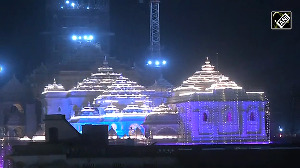As India approaches its 60th year of independence on Aug. 15, the world marvels at the country's rapid economic ascendancy. The emergence of India's globally ambitious business outsourcing companies such as Infosys and Wipro and high-profile cross-border mergers such as Tata Steel's $11.3 billion deal to buy British steelmaker Corus continue to make the country a fascinating business story.
India is also evolving from foreign direct investment backwater to money magnet for global multinationals. Foreign executives across a swathe of industries, from autos to consumer goods, see a huge consumer economy emerging as years of high-speed growth in the 8 per cent range enlarge India's middle class.
Slide shows:
India's 50 most powerful people
The many faces of Tata Group
By 2025, India is expected to emerge as the world's fifth-biggest consumer market as incomes and living standards improve, according to a study by the McKinsey Global Institute. Nearly 300 million Indians are expected to escape poverty, and the middle class will leapfrog by a factor of 10 - from 50 million today to roughly 583 million 18 years from now.
The country's Top 50
Often less noticed are the individual figures - the politicians, business leaders, and cultural pathfinders - instrumental in India's remarkable rise on the world stage. Without the initiative, enlightened leadership, business smarts, and style of scores of notable Indian leaders, there would be no economic miracle.
So who are the movers and shakers refashioning contemporary India? That's what a team of BusinessWeek editors sought to discover by compiling a list of the country's 50 most powerful leading lights in politics, the economy, and society. To take a look at the names we came up with in this by-no-means exhaustive list, check out the slide show we have assembled.
Some of our choices aren't controversial. They include Tata Group chairman Ratan Tata, whose conglomerate is in the midst of a dramatic expansion and is interested in the Jaguar luxury car business now controlled by Ford. (Tata is up against private equity player Ripplewood Holdings in that bidding contest.)
A sporting chance
In the political sphere, Commerce Minister Kamal Nath, once considered a less-than-impressive member of the Congress Party, has emerged as one of the country's most reform-minded politicians. He has put in place a new patent act, deregulated the retail industry, and has been a fierce advocate for the developing world in the current contentious Doha round of global trade talks.
Indian sporting and cultural figures are also inspiring Indians at home and gaining followings abroad. Sachin Tendulkar is still the star master batsman of the Indian cricket team, but he's getting competition from younger lads from the farthest corners of India. And tennis star Sania Mirza has wowed Indian sports fans in a country where cricket rules.
Indian fashion designers are mixing traditional local fashion motifs with a contemporary feel, and some, such as Ritu Kumar and Tarun Tahiliani, are making their presence felt internationally. Celebrities and creative talent from the Bollywood film industry - still wildly popular from Jakarta to Jeddah, with its musical routines and family fare - are also well-represented on the list.
Widening the circle
Of course, when it comes to India's robust economy, many heroes are to be found in the corporate world.
Slide show: Bangalore wannabes
With the IT industry no longer the sole face of a global India, this list draws special attention to rising industrialists such as B Muthuraman at Tata Steel and Kumar Mangalam at diversified Aditya Birla Group.
That's not to say that Infosys' N R Narayana Murthy, Wipro's Azim Premji, and Tata Consultancy Services' S Ramadorai are not interesting executives, but there's more to India than just outsourcing. Similarly, you won't find Arcelor Mittal's Lakshmi Mittal on the list, despite his fame in the global steel industry. He's a British citizen and has only recently started looking at investing in India.
Make no mistake: India has plenty of challenges ahead. Its vibrant outsourcing sector faces the twin challenges of rising wages and stiffer competition at home from the likes of IBM and Accenture. For every enlightened politician, there are others who stand in the way of economic progress.
Yet the odds are good that India's economic and social dynamism (it is home to the youngest population in the world) will be worth watching closely in the years ahead. And the individuals that make up BusinessWeek's India's 50 Most Powerful People roster will be playing leading roles in this drama.






 © 2025
© 2025